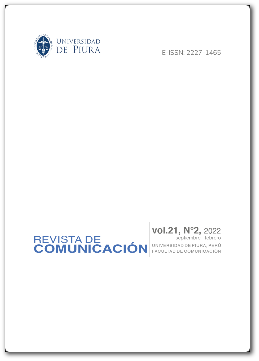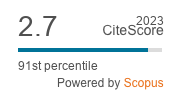Polarization and hate speech with gender bias associated with politics: analysis of interactions on Twitter
DOI:
https://doi.org/10.26441/RC21.2-2022-A2Keywords:
hate speech, disinformation, information disorders, gender, sexism, emotions, politicsAbstract
The spread of hate speech through social media contributes to poisoning the public sphere and undermining the quality of liberal democracies. This type of discourse is particularly virulent against the political class and against feminism. Taking this reality as a starting point, this research will attempt to identify the gender bias in hate speech in the political sphere: do female politicians receive more verbal attacks than their male counterparts, not because they are politicians, but because they are women? Do female politicians receive more emotional polarity in the mentions they receive on Twitter than their male counterparts? Through discourse analysis using PLN techniques for emotion detection and text mining on a corpus of 3,483,232 tweets collected from 20 accounts of Spanish politicians, it is found that the messages received by women politicians concentrate more emotional polarity than men's, but not more hatred, which is slightly higher in men. It also confirms that sexist and misogynist expressions are used to denigrate women and, by extension, feminism, which makes hate speech a type of information disorder.
Metrics
References
Amnistía Internacional (2021). Troll patroll. https://bit.ly/3nhoBBr
Anti-defamation League (ADL) (2017). Pyramid of Hate. https://bit.ly/3A0MyV9
Arce-García, S., & Menéndez-Menéndez, M.I. (2018). Aplicaciones de la estadística al framing y la minería de texto en estudios de comunicación. Información, cultura y sociedad, 39, 61-70. https://doi.org/10.34096/ics.i39.4260 DOI: https://doi.org/10.34096/ics.i39.4260
Amores, J. J., Blanco-Herrero, D., Sánchez-Holgado, P., & Frías-Vázquez, M. (2021). Detectando el odio ideológico en Twitter. Desarrollo y evaluación de un detector de discurso de odio por ideología política en tuits en español. Cuadernos.Info, 49, 98–124. https://doi.org/10.7764/cdi.49.27817 DOI: https://doi.org/10.7764/cdi.49.27817
Arcila-Calderón, C., Sánchez-Holgado, P., Quintana-Moreno, C., Amore, J-J., Blancho-Herrero, D. (2022). Discurso de odio y aceptación social hacia migrantes en Europa: Análisis de tuits con geolocalización. Comunicar, 71, 21-35. https://doi.org/10.3916/C71-2022-02. DOI: https://doi.org/10.3916/C71-2022-02
Avaaz (2019). Whatsapp Social Media´s dark web. How the messaging service is being flooded with lies and hate speech ahead of the spanish elections. Avaaz.org. https://bit.ly/3FIViyY
Barrie, C., & Chun-ting, H. (2021). AcademictwitteR: an R package to access the Twitter Academic Research Product Track v2 API endpoint. Journal of Open Source Software, 6(62), 3272. https://doi.org/10.21105/joss.03272. DOI: https://doi.org/10.21105/joss.03272
Bassignana, E., Basile, V., & Patti, V. (2018). Hurtlex: A multilingual Lexicon of Words to Hurt. Proceedings of the Fifth Italian Conference on Computational Linguistics CLiC-it 2018. Collana dell'Associazione Italiana di Linguistica Computazionale. https://doi.org/10.4000/books.aaccademia.3085 DOI: https://doi.org/10.4000/books.aaccademia.3085
Bernal-Triviño, A., & Clares-Gavilán, J. (2019). Uso del móvil y las redes sociales como canales de verificación de fake news. El caso de Maldita.es. Profesional de la información, 28(3), https://doi.org/10.3145/epi.2019.may.12 DOI: https://doi.org/10.3145/epi.2019.may.12
Blanco-Alfonso, I., Chaparro-Domínguez, M., & Repiso, R. (2021). El fact-checking como estrategia global para contener la desinformación. Estudios sobre el Mensaje Periodístico, 27(3), 779-791. https://doi.org/10.5209/esmp.76189 DOI: https://doi.org/10.5209/esmp.76189
Burnap, P., & Williams, M.L. (2015). Cyber hate speech on Twitter: An application of machine classification and statistical modeling for policy and decision making. Policy & Internet, 7(2), 223-242. https://doi.org/10.1002/poi3.85 DOI: https://doi.org/10.1002/poi3.85
Campos-Domínguez, E., Esteve-Del-Valle, M. Renedo-Farpón, C. (2022). Retóricas de desinformación parlamentaria en Twitter. Comunicar, 72, 47-58. https://doi.org/10.3916/C72-2022-04 DOI: https://doi.org/10.3916/C72-2022-04
Cid, G. (2019). Los ‘deepfakes’ ya son un negocio millonario: cómo evitar que te engañen. El Confidencial. https://bit.ly/3wnOpjb
DW (2021). Alemania: desinformación y noticias falsas asedian la campaña electoral. DW.com https://bit.ly/31H21e6
Ferruz-Gónzalez, S.A., Rodríguez-Fernández, L., & Rubio-Romero; J. (2020). Visibilidad del liderazgo femenino en Twitter: aproximación sobre el ranking Top 100. Mujeres líderes en España. Revista Mediterránea de Comunicación, 12(2), 45-64. https://doi.org/10.14198/MEDCOM.18839 DOI: https://doi.org/10.14198/MEDCOM.19179
Gagliardone, I., Gal, D., Alves, T., & Martínez, G. (2015). Countering Online Hate Speech. Programme in Comparative Media Law and Policy. University of Oxford.
Garrido, A., Martínez Rodríguez, M. A., & Mora Rodríguez, A. (2021). Polarización afectiva en España. Más Poder Local, 45, 21-40. https://bit.ly/3HM8uoF
Gil Pascual, J. A. (2021). Minería de textos con R. Aplicaciones y técnicas estadísticas de apoyo. UNED.
Gidron N., Adams, J., & Horne, W. (2018). How Ideology, Economics and Institutions Shape Affective Polarization in Democratic Polities. American Political Science Association.https://bit.ly/2ZrNGS4
Guerrero-Solé, F., & Philippe, O. (2020). La toxicidad de la política española en Twitter durante la pandemia de la COVID-19. Hipertext.net, 21, 133-139. https://doi.org/10.31009/hipertext.net.2020.i21.12 DOI: https://doi.org/10.31009/hipertext.net.2020.i21.12
Herrero-Diz, P., Pérez-Escolar, M., & Plaza Sánchez, J.F. (2020). Desinformación de género: análisis de los bulos de Maldito Feminismo. Icono 14, 18(2), 188-216. https://doi.org/10.7195/ri14.v18i2.1509 DOI: https://doi.org/10.7195/ri14.v18i2.1509
Ipsos (2021). Sentimiento de sistema roto en 2021. Populismo, anti-elitismo y nativismo. https://bit.ly/3xmAHxs
Igareda-González, N., Alberto-Pascale, A., Fejös, A, Zentai, V., Cankurt, I., Sette, R., Sicurella, S., Schulz, A., Wilhelm, C., Bladini, M., Helmstad, A., & Svensson, E-M. (2021). Map of the main political parties using hate speech against the “ideology of gender” through the social networks and internet in Europe. https://bit.ly/3HV3L4A
Jankowicz, N. (2017). How Disinformation Became a New Threat to Women. codastory.com. https://bit.ly/3x3ukPh
Jockers, M. (2017). Syuzhet, extracts sentiment and sentiment-derived plot arcs from text. https://bit.ly/3bmyTxr
Kearney, M. (2020). Detect Twitter Bots: tweetbotornot2. https://bit.ly/3HZtpoM
Liddy, E.D. (1998). Enhanced text retrieval using natural language procesing. Bolletin of the American Society for Information Science and Technology, 24(4), 14-16. http://doi.org/10.1002/bult.91 DOI: https://doi.org/10.1002/bult.91
Lim, M. (2017). Freedom to hate: social media, algorithmic enclaves, and the rise of tribal nationalism in Indonesia. Critical Asian Studies, 49(3), 411–427. https://doi.org/10.1080/14672715.2017.1341188 DOI: https://doi.org/10.1080/14672715.2017.1341188
Luque-Ortíz, S., & Cano-Alarcón, M. (2020). La violencia de género en Twitter según Vox en las elecciones autonómicas de Andalucía. Ámbitos. Revista Internacional de Comunicación, 51, 116-133. https://doi.org/10.12795/Ambitos.2021.i51.08 DOI: https://doi.org/10.12795/Ambitos.2021.i51.08
Martini, F., Samula, P., Keller, T.-R., & Klinger, U. (2021). Bot, or not? Comparing three methods for detecting social bots in five political discourses. Big Data & Society, 8(2), 1-13. https://doi.org/10.1177/20539517211033566 DOI: https://doi.org/10.1177/20539517211033566
Marwick, A., & Lewis, R. (2017). Media Manipulation and Disinformation Online. Data & Society. https://bit.ly/3CS4v70
Mohammad, S. (2016). Sentiment Analysis: Detecting Valence, Emotions, and Other Affectual States from Text. Emotion Measurement, 2016, 201-237. https://doi.org/10.1016/B978-0-08-100508-8.00009-6 DOI: https://doi.org/10.1016/B978-0-08-100508-8.00009-6
Mohammad, S., & Turney, P. (2010). Emotions Evoked by Common Words and Phrases: Using Mechanical Turk to Create an Emotion Lexicon. Proceedings of the NAACL-HLT 2010 Workshop on Computational Approaches to Analysis and Generation of Emotion in Text. June 2010. LA, California.
Mohammad, S., & Turney, P. (2013). Crowdsourcing a Word-Emotion Association Lexicon. Computational Intelligence, 29(3), 436-465. https://doi.org/10.1111/j.1467-8640.2012.00460.x DOI: https://doi.org/10.1111/j.1467-8640.2012.00460.x
Moreno Cantano, A.C., & Calvillo Cisneros, J.M. (2021). Propaganda del odio contra los Rohingyas. Estudio del caso de Facebook y Twitter. Pineda, A., & Sánchez Gutierrez, B. (eds.), Comunicación política en el mundo digital: tendencias actuales en propaganda, ideología y sociedad (pp. 792-814). Dykinson.
Núñez Puente, S., & Fernández Romero, D. (2018). Discurso visual posmachista en Twitter: análisis multimodal de la iconicidad de la victimización. Digitos, 4, 131-148. http://dx.doi.org/10.7203/rd.v0i4.127
Occeñola, P. (2018). Fake news real women: Disinformation gone macho. When disinformation is weaponized against women, misogyny rears its ugly head. Rappler. https://bit.ly/3CV5rYi
ONU Mujeres (2021). Hechos y cifras: Liderazgo y participación política de las mujeres. Unwomen.org. https://bit.ly/3F1NVlE
Pardy, N. (2018). How The Fake News Industry Weaponizes Women. Refinery29. https://r29.co/3D0CpXo
Parekh, B. (2006). Hate speech. Is there a case of banning? Public Policy Research, 12(4), 213-223. https://doi.org/10.1111/j.1070-3535.2005.00405.x DOI: https://doi.org/10.1111/j.1070-3535.2005.00405.x
Piñeiro-Otero, T., & Martínez-Rolán, X. (2021). Eso no me lo dices en la calle. Análisis del discurso del odio contra las mujeres en Twitter. Profesional De La Información, 30(5), 1-17. https://doi.org/10.3145/epi.2021.sep.02 DOI: https://doi.org/10.3145/epi.2021.sep.02
Plutchik, R. (1980). A general psychoevolutionary theory of emotion. Plutchik, R. & H. Kellerman (eds.), Emotion: Theory, Research, and Experience (pp. 3-33). Academic Press. DOI: https://doi.org/10.1016/B978-0-12-558701-3.50007-7
Posetti, J., Shabbir, N., Maynard, D., Bontcheva, K., & Aboulez, N. (2021). Online violence Against Women Journalists: A Global Snapshot of Incidence and Impacts. UNESCO. https://bit.ly/3ocsSWQ
Ramírez-García, A., González-Molina, A., Gutiérrez-Arenas, M-P., & Moyano-Pacheco, M. (2021). Interdisciplinariedad de la producción científica sobre el discurso del odio y las redes sociales: Un análisis bibliométrico. Comunicar, 72, https://doi.org/10.3916/C72-2022-10 DOI: https://doi.org/10.3916/C72-2022-10
Ramírez Plascencia, D., Alonzo González, R. M., & Ochoa Amezquita, A. (2022). Odio, polarización social y clase media en Las Mañaneras de López Obrador. Doxa Comunicación, 35. https://doi.org/10.31921/doxacom.n35a1505 DOI: https://doi.org/10.31921/doxacom.n35a1505
Rivas Venegas, M. (2021). Contra las mujeres: el discurso misógino de Vox. “Palabras gruñido” del nacionalpopulismo español. Revista de Investigaciones Feministas, 12(1), 67-77. https://dx.doi.org/10.5209/infe.69585 DOI: https://doi.org/10.5209/infe.69585
Robles, J.M., Guevara, J.A., Casas-Mas, B., & Gömez, D. (2022). Cuando la negatividad es el combustible. Bots y polarización política en el debate sobre el COVID-19. Comunicar, 71, 63-75. https://doi.org/10.3916/C71-2022-05 DOI: https://doi.org/10.3916/C71-2022-05
Rodríguez-Fernández, L. (2021). Propaganda digital: comunicación en tiempos de desinformación UOC.
Sarapura Sarapura, M. M. (2021). El discurso del odio sexista a través de las redes sociales como reacción al himno “Un violador en tu camino”. Razón y Palabra, 24(111), 116-140. https://doi.org/ 10.26807 /rp.v25i 111.1807 DOI: https://doi.org/10.26807/rp.v25i111.1807
Sauter, D.A., Eisner, F., Ekman, P., & Scott, S. (2010). Cross-cultural recognition of basic emotions through nonverbal emotional vocalizations. Proceedings of the National Academy of Sciences, 107(6), 2408–2412. https://doi.org/10.1073/pnas.0908239106 DOI: https://doi.org/10.1073/pnas.0908239106
Searle, J. (2009). Actos de habla. Cátedra.
Sessa, M.G. (2020). Misogyny and Misinformation: An analysis of gendered disinformation tactics during the COVID-19 pandemic. Disinfo.eu. https://bit.ly/3EY8QpP
Smith, M. A., Rainie, L., Shneiderman, B., & Himelboim, I. (2014). Mapping Twitter topic networks: From polarized crowds to community clusters. The Pew Research Center. https://pewrsr.ch/3xUK203
Spring, M. (2021). La periodista de la BBC brutalmente troleada en redes sociales (y las impactantes revelaciones de su experimento). BBC.com. https://bbc.in/3qfMqfN
Stabile, B., Grant, A., Purohit, H., & Harris, K. (2019). Sex, Lies, and Stereotypes: Gendered Implications of Fake News for Women in Politics. Public Integrity, 21, 491–502. https://bit.ly/31LSKBx DOI: https://doi.org/10.1080/10999922.2019.1626695
The Economist Intelligence Unit (2020). Measuring the prevalence of online violence against women. https://bit.ly/3qfA8ns
Unión Interparlamentaria (2016). Sexism, harassment and violence against women parliamentarians. ipu.org. https://bit.ly/3o6nIf4
Unión Interparlamentaria (2018). Sexism, harassment and violence against women in parliaments in Europe. ipu.org. https://bit.ly/308aw12
Williams, M. (2021). The Science of Hate. Faber&Faber.
Downloads
Published
How to Cite
Issue
Section
License
Copyright (c) 2022 Revista de Comunicación

This work is licensed under a Creative Commons Attribution-NonCommercial-NoDerivatives 4.0 International License.












 Portal de Revistas de la Universidad de Piura.
Portal de Revistas de la Universidad de Piura.